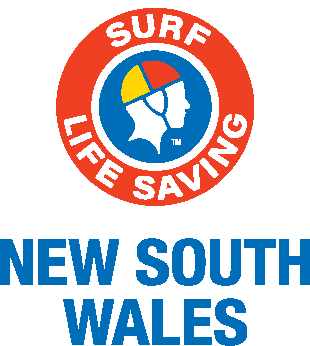Early on 31 December 2019, the Far South Coast community woke to an emergency text message. Fire was an imminent threat.
public://video_embed_field_thumbnails/youtube/HESFM4WK_oo.jpg
a:1:{s:7:"handler";s:7:"youtube";}
It was just after 3am when Surf Life Saving Far South Coast Director of Lifesaving Cheryl McCarthy and the Bermagui club callout team got their first alert. The team moved quickly to set up their club as an evacuation staging point not yet realising the day that was about to unfold.
People had started arriving at Bermagui SLSC by 3.30am. At 5.30am people were pouring into the club and grounds were packed. The local community, as well as tourists, were seeking refuge.
Emergency alerts continued as fire impacted towns up and down the far south coast and neighbouring surf clubs also opened their doors. Time was now ticking to evacuate as the fires roared out of control and towards the coast.
The morning of the 31 December signalled the start of Surf Life Saving NSW’s bushfire response on the NSW Far South Coast. A response that would see teams of volunteer surf lifesavers take responsibility for the lives of over 7,000 people as multiple surf clubs set up as emergency evacuation and support centres.
Cheryl McCarthy is used to emergency callouts becoming more frequent and the incidents she responds to more unusual. She expects the unexpected and complex emergencies, like the recent NSW bushfires, are becoming the ‘new normal’ for her and thousands of volunteer emergency service personnel like her.
But nothing could have prepared her team for the speed and ferocity of the bushfire emergency that engulfed the Far South Coast region on New Year’s Eve 2019 and the scale of the response effort they would be asked to lead that week.
Since becoming a gazetted emergency service organisation in 2018, Surf Life Saving NSW volunteer lifesavers have been tasked to critical incidents in support of other emergency service organisations such as Police, RFS and SES. And so it was that on December 31, Surf Life Saving NSW volunteers on the Far South Coast found themselves on the frontline when the call came to respond to the unprecedented bushfire emergency unfolding all around them.
Up the road in Batemans Bay, Anthony Bellette received an alert message from the RFS and directing people towards beaches and he quickly headed to the surf club with other callout team members to open the Batemans Bay surf club to take in people as residents in the area began evacuating to the beach.
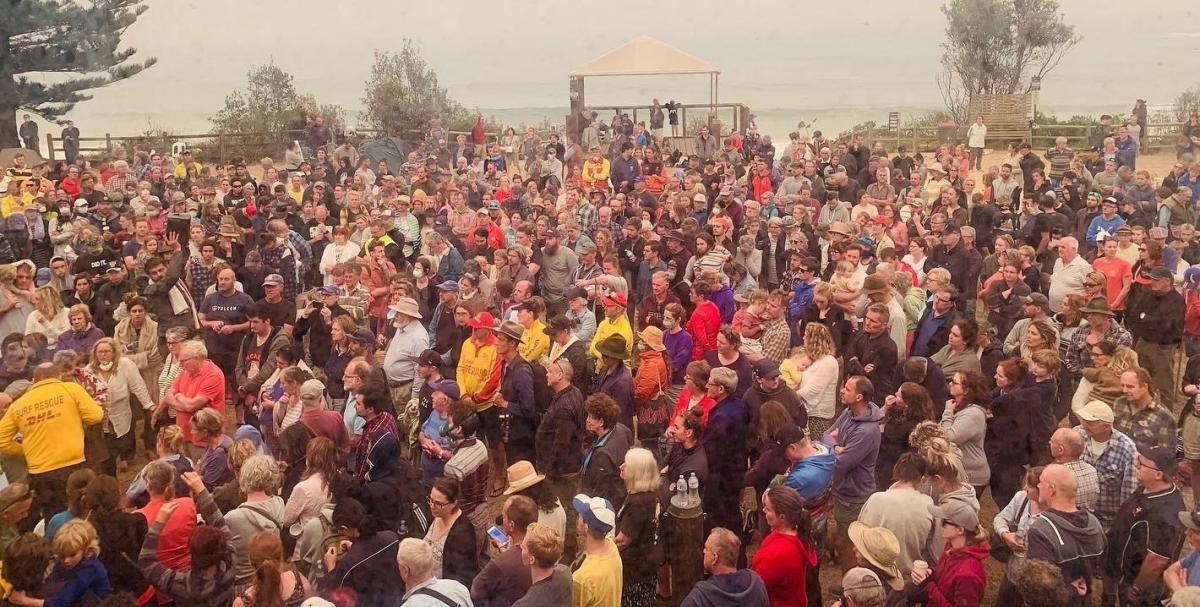
People, their cars and their animals began pouring in and within a few hours, the three surf clubs at Bermagui, Broulee and Batemans Bay would together be sheltering more than 7,000 people as bushfires raged out of control in the area. And it was the volunteer Surf Life Saving teams, that would be responsible for their welfare, providing those in their care with food, water, shelter and vital medical treatment.
To put the scale of the evacuation in perspective, the township of Bermagui normally has a population of just over1,500. But as bushfires approached the area at an unprecedented speed and residents and tourists in a 30km radius of the town were told to evacuate to the beach, the town’s population quickly grew to 5,000. These evacuees descended on the Bermagui surf club.
“It kind of snowballed. For a town of 1,500, suddenly having 5,000 people arrive at the surf club was overwhelming,” said Cheryl. “Nothing could have prepared us for the sheer number of people that made their way to our club that day.”
It wasn’t until the team looked at their watches at 9am and it was still dark that they realised the sun wasn’t going to come up that day. “It was dark,” she said. “Just really dark when your brain was expecting to see some light. And the smoke was so thick it choked you up.”
Sadly as the hours went on the tragedy became more real. “Throughout the morning people at the club house started to get news that family and friends had lost homes and tragically for some, they’d lost loved ones,” Cheryl said. “The Surf Life Saving family rallied around those who needed it. They saw what work needed to be done. There was so much to do and so many who needed assistance.
And the help came from all over with everyone who could lend a hand just jumping into a role that suited their skills.
“We had several medical professionals who stepped into take the lead to help treating serious issues,” said Cheryl.
The local medical centre relocated doctors, nurses and equipment to the Bermagui surf club who slept there for 48 hours. They treated nearly 200 people with breathing difficulties and other injuries.
Local businesses donated food, tents and oxygen cylinders to treat people with respiratory problems. A local chef swung into action and prepared what Cheryl suggests might have been ‘the best evacuation meal ever eaten’.
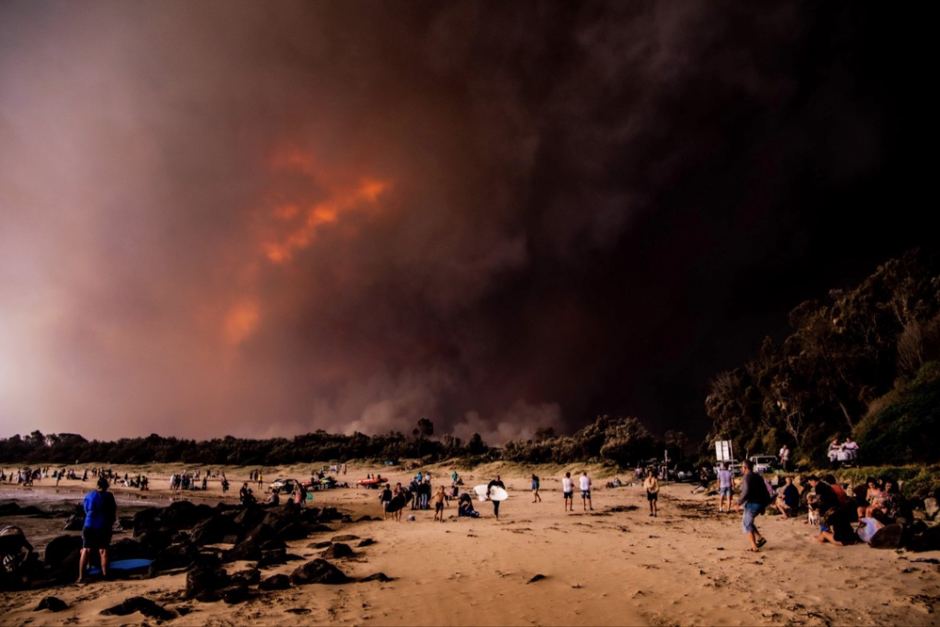
Meanwhile, 80km north, Broulee had come under direct and significant ember attack around the community. Members of the public quickly moved to the surf club for shelter.
“It was my biggest day as a Duty Officer in terms of complexity and an evolving situation,” said Andy Edmunds who led a team of Broulee SLSC members who quickly came to assist.
“When the fire hit Broulee and some of the buildings started going up, we called Triple Zero but RFS crews weren’t immediately available, although there were some helicopters waterbombing some spot fires in the town,” Andy said.
Thinking quickly, the team sent the club’s all-terrain buggies into the streets, started registering members of the public, triaging vulnerable persons and performing first aid as needed. Volunteer surf lifesavers door-knocked and used loud hailers to evacuate residents who either could not walk to the club or had missed the evacuation message entirely.
At one stage the Broulee surf club itself was threatened by the fires and all 1,000 people had to be moved onto the beach. At the same time, people started arriving at the club with serious injuries.
“Our members, along with Eurobodalla Shire Council Lifeguards, were treating some fairly major burns injuries and a family of six people presented who were all suffering from severe smoke inhalation. We gave them all oxygen and called an ambulance but it took two hours to arrive,” Andy said.
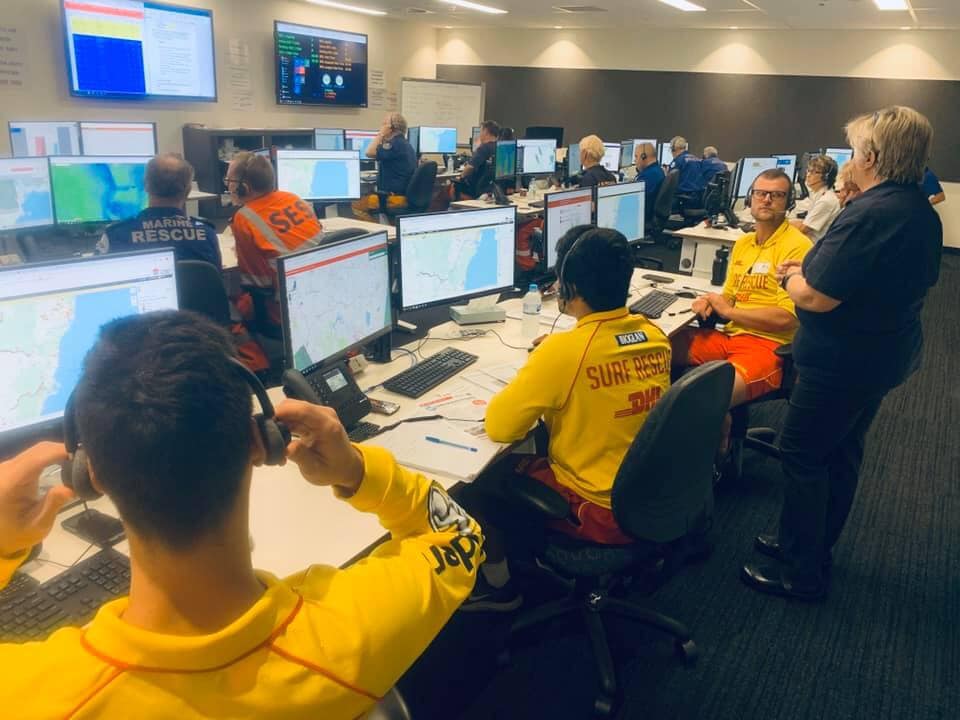
Andy praised the seamless work between the Broulee team and local police initially as well as community members who kept people as calm and as safe as possible. “It really was a huge team effort,” said Andy “Our members worked tirelessly around the clock particularly Natalie Browning, Darren Browning, Claire Forbes and the Canberra Broulee George Bass Marathon crew.”
Fortuitously, Surf Life Saving NSW had positioned volunteer liaison officers in the NSW Rural Fire Service Headquarters in Sydney at the beginning of the bushfire crisis.
“We had no power and no mobile phone coverage. But we still had our surf club UHF radios and I was in contact with our Surf Life Saving liaison officer at the Rural Fire Service headquarters in Sydney. They were able to relay to us what was going on with the fires,” said Andy.
Fortunately for Broulee residents, the weather changed just before a large fire front reached the town and a change in wind direction pushed the fires away from the town.
“The only thing that saved Broulee was the southerly wind that came up the coast at the last minute. It was so strong that it could have stripped paint off your car.
“We weren’t set up to accommodate people overnight so the evacuees either went home or were transported to the Moruya Showground,” Andy said.
Fortuitously the George Bass surfboat marathon event had brought hundreds of surf lifesavers to the Far South Coast for the week. Wherever they happened to be stuck that day, the competitors and their support crews jumped into action. Many of them made themselves available to assist with the emergency response and were themselves seeking shelter at the surf clubs.
“It was a real team effort. We had the George Bass surfboat crews helping us triage patients, providing medical help. They also helped marshal traffic and assisted with registering people as they arrived at the club. It was an amazing job by everyone,” said Cheryl.
“Hopefully this is something we never have to witness again, but the compassion and professionalism of our members was at the forefront. I’d like to thank each and every member who assisted throughout this emergency, and if I could also praise Eurobodalla Shire Council, Essential Energy, local police and RFS for their combined efforts in this unprecedented emergency for their devotion and assistance in recovery,” said Andy.
Although the southerly change reduced the immediate threat of the bushfires, the work of the volunteers wasn’t yet over. Broulee, Batemans Bay and Bermagui surf clubs all community support centres at times throughout the week.
With roads closed, electricity cut-off and all phone services out for more than seven days at places along the Far South Coast, the surf clubs became important centres for people displaced by the fires to have a meal, shower, collect groceries and use the free Wi-Fi that had been set up.
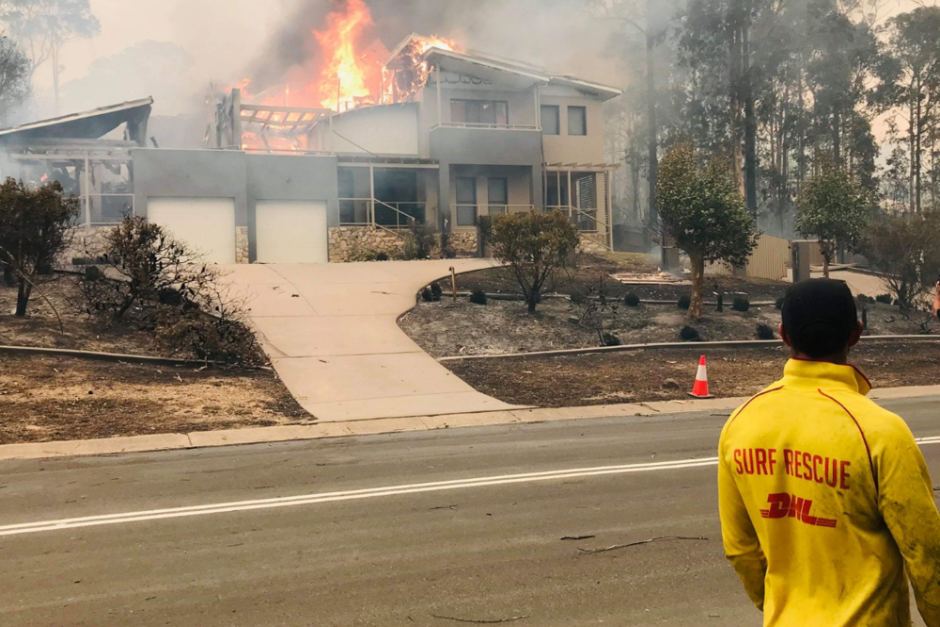
“Our club became a community hub – a safe and trusted space for people to come and have a shower and a feed and to just talk about what had happened to them,” said Batemans Bay Club Captain Anthony Bellette. Members of the public contacted Surf Life Saving in the weeks following to praise Bateman’s Bay team for their response during and after the bushfires.
Demonstrating their growing importance as community hubs, Batemans Bay, Broulee and Bermagui surf clubs were established as distribution centres for donated items of food, water, clothing and other essentials as surf clubs and the wider community across NSW rallied to provide support and transport donated goods to the Far South Coast.
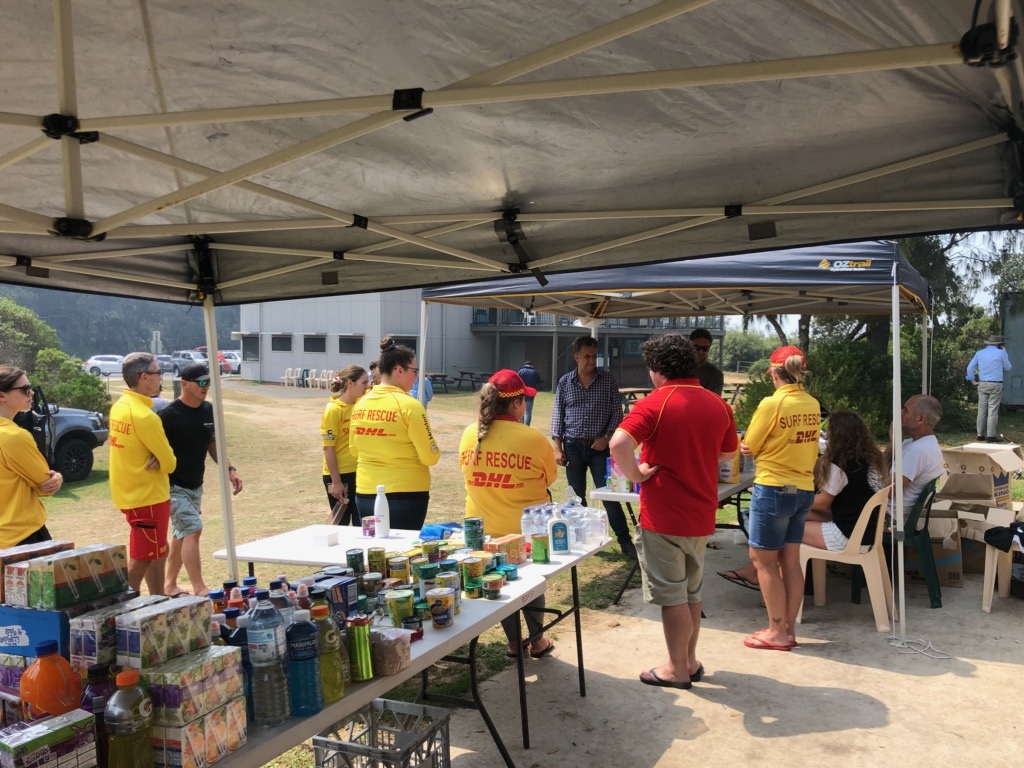
Reflecting on the events over New Year’s, Cheryl says that the emergency was the biggest response the Far South Coast support operations team and members has had to deal with collectively,”
The extent of the response to the bushfires on the Far South Coast demonstrated how the role of surf lifesavers has evolved. It’s clear the impact volunteers can have on their communities and how it now extends well beyond the beach.
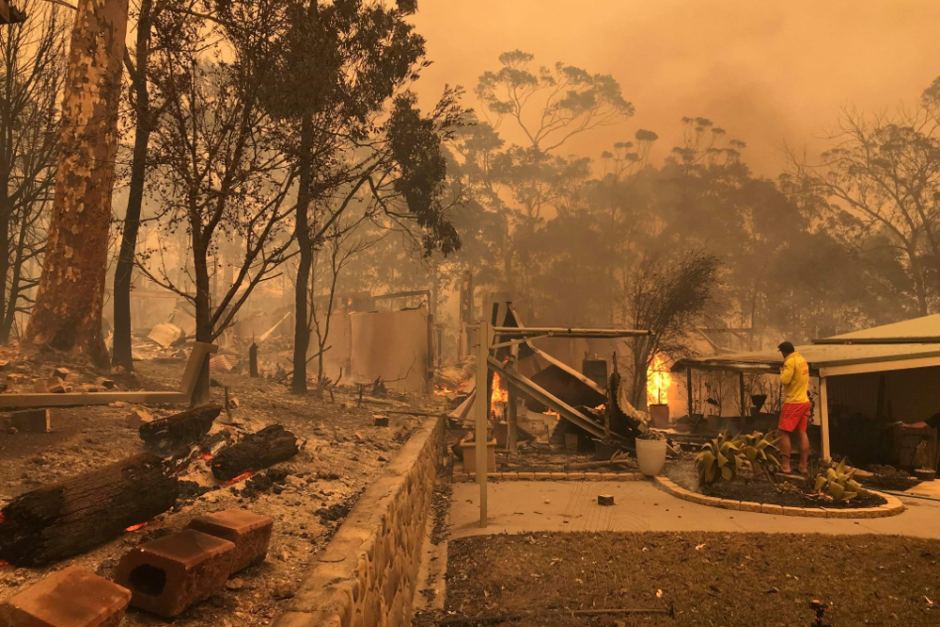
Thursday 6 February 2020
If you have experienced any distress while reading this or any article regarding the bushfires, please use the following resources to seek support:
For immediate assistance, call 1800 808 374 to receive confidential 24/7 over the phone professional assistance from SLSNSW Employee Assistance Program provider – Assure Programs.
If you have been tasked to attend an event or have experienced a reaction to an incident while on duty as a lifesaver, the SLSNSW Member Welfare Officer is available to discuss options for additional support and can be contacted on memberwelfare@surflifesaving.com.au or 0455 726 221 during business hours.
